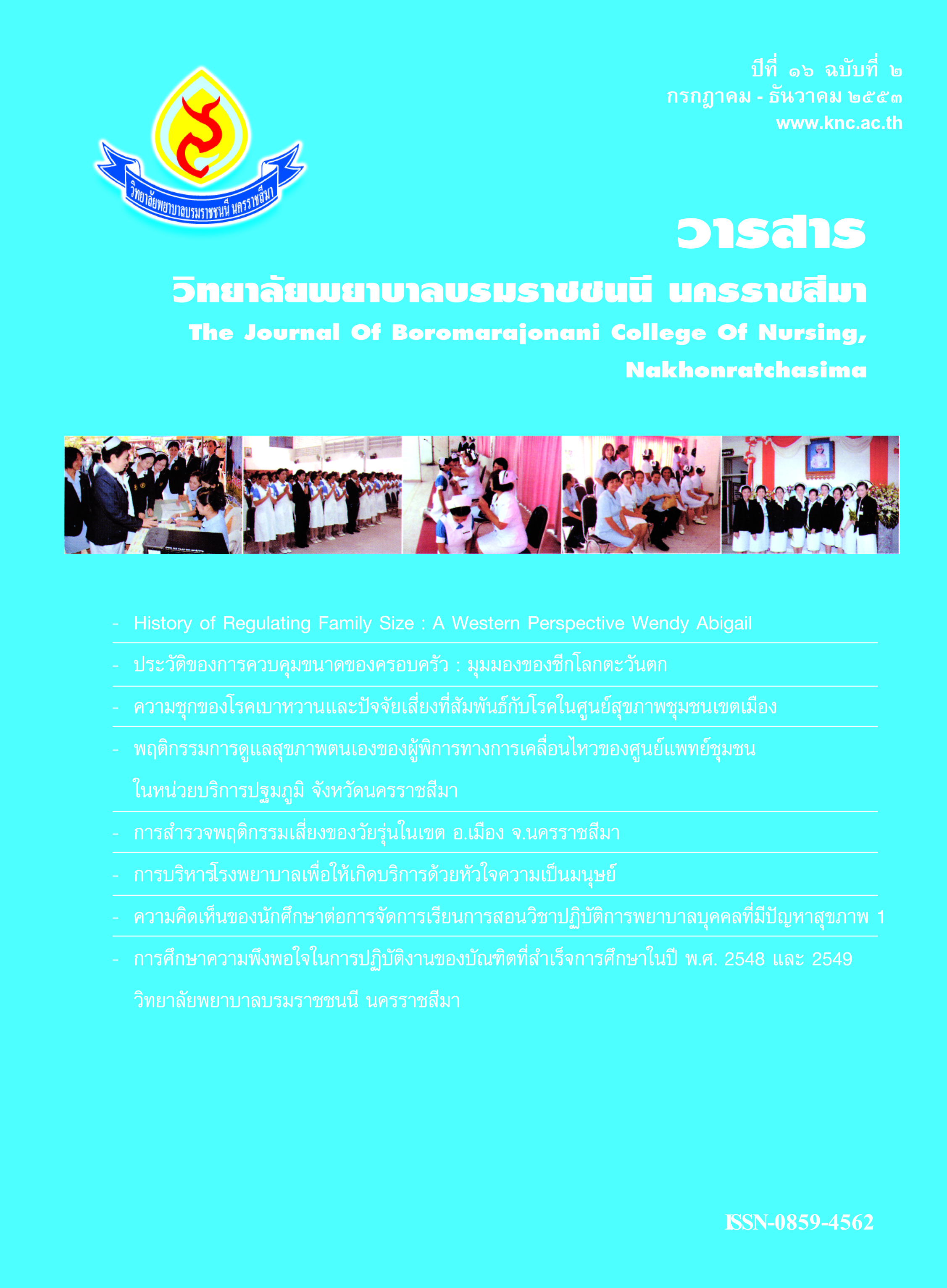พฤติกรรมการดูแลสุขภาพตนเองของผู้พิการทางการเคลื่อนไหวของศูนย์แพทย์ชุมชน ในหน่วยบริการปฐมภูมิ จังหวัดนครราชสีมา
คำสำคัญ:
พฤติกรรมการดูแลสุขภาพ, ผู้พิการ, หน่วยบริการปฐมภูมิ, self-care behaviors, movement disabilities, primary care unitบทคัดย่อ
บทคัดย่อ
การศึกษาครั้งนี้เป็นการวิจัยแบบตัดขวาง เพื่อศึกษาพฤติกรรมการดูแลสุขภาพของผู้พิการทางการเคลื่อนไหวในเครือข่ายปฐมภูมิเมืองย่า 5 ประชากรที่ศึกษา คือ ผู้พิการทางการเคลื่อนไหวทุกคนที่มีชื่อในทะเบียนผู้พิการเครือข่ายปฐมภูมิ เมืองย่า จำนวน 174 คน เก็บข้อมูลเป็นระยะเวลา 9 เดือน (กุมภาพันธ์ -ตุลาคม 2552) โดยใช้แบบสัมภาษณ์ที่ดัดแปลงมาจาก แบบประเมินความสามารถในการทำกิจกรรมของผู้พิการ ของศูนย์สิรินธรเพื่อการฟื้นฟูสมรรถภาพทางการแพทย์แห่งชาติ กระทรวงสาธารณสุข ผลการศึกษา พบว่า ผู้พิการส่วนใหญ่เป็นเพศชาย (ร้อยละ 58.00) อายุเฉลี่ย 55.6 ปี มีสถานภาพสมรสคู่ (ร้อยละ 43.70) เป็นหัวหน้าครอบครัว และมีบัตรผู้พิการ (ร้อยละ 41.90) ส่วนใหญ่เป็นผู้พิการระดับ 3 (ร้อยละ 32.70) สาเหตุของความพิการมาจากการเจ็บป่วย (ร้อยละ 70.70) และความพิการแต่กำเนิด (ร้อยละ 12.10) ระยะเวลาที่มีความพิการเฉลี่ย 7 ปี แต่ส่วนมากอยู่ในช่วง 1-5 ปี ผลการประเมินพฤติกรรมสุขภาพพบว่าผู้พิการส่วนมาก สามารถอาบน้ำ สระผม ทำความสะอาดหลังขับถ่ายได้ (ร้อยละ 90.00) สามารถเข้ากับครอบครัวได้ดี (ร้อยละ 98.30) ไม่มีภาระหนี้สิน (ร้อยละ 82.20) เคยไม่สบายใจจนนอนไม่หลับ (ร้อยละ 60.90) มีความเครียดระดับปานกลาง (ร้อยละ43.70) และต้องการความช่วยเหลือจากรัฐและผู้เกี่ยวข้องในการจัดหาอุปกรณ์ช่วยในการเคลื่อนไหว (ร้อยละ 97.00) จากผลการศึกษาดังกล่าวหน่วยงานที่รับผิดชอบสามารถนำไปใช้ในการวางแผนดูแลผู้พิการได้อย่างเหมาะสมและตรงตามความต้องการของผู้พิการ เพื่อให้ผู้พิการมีคุณภาพชีวิตที่ดี
คำสำคัญ : พฤติกรรมการดูแลสุขภาพ, ผู้พิการ, หน่วยบริการปฐมภูมิ
Abstract
This cross-sectional study aimed to explore self-care behaviors of patients with movement disabilities. The study population was 174 patients with movement disabilities treated in primary care units under contract for primary care, Muangya 5, Nakhonratchasima. Data was collected for nine months (February – October 2009) by using a questionnaire adapted from the disabled assessment tool designed by Sirindhorn National Medical Rehabilitation Center (SNMRC), Ministry of Public Health. The questionnaire was divided into five dimensions: psychical and capable, mental, social, economical, and needs from other government and involved persons. Findings revealed that most patients with movement disabilities were male (58.6%) with an average age of 55.6 years old. Most of them were married (43.7%), were the income provider (41.9%), had a disability identification card (41.9%), and were in the third-level of disabilities (32.7%). The most prevalent causes of their disabilities were acquired diseases (70.7%) and congenital malformations (12.1%). Average duration of being disabled was 7 years, but most range from 1-5 years. Results from the assessment tool found that most patients could clean their body, such as take a bath, wash hair, and clean after defecation (90%), got along with their family (98 %), were not in debt (82.2%), and experienced sleeplessness due to stress (60.9%). The assessment tool also discovered that most patients (43.7%) were under at least moderate stress. In summary, patients with movement disabilities need physical and mental health care and ambulatory aids. Responsible agents can use this data to make care plans to meet the needs of patients with movement disabilities to improve their quality of life.
Keywords : self-care behaviors, movement disabilities, primary care unit
ดาวน์โหลด
ฉบับ
ประเภทบทความ
สัญญาอนุญาต
บทความที่ได้รับการตีพิมพ์เป็นลิขสิทธิ์ของ วารสารสุขภาพและการศึกษาพยาบาล ซึ่งดำเนินการโดยวิทยาลัยพยาบาลบรมราชชนนี นครราชสีมา
ข้อความที่ปรากฏในบทความในวารสารเล่มนี้เป็นความคิดเห็นส่วนตัวของผู้เขียนแต่ละท่านไม่เกี่ยวข้องกับกองบรรณาธิการวารสารสุขภาพและการศึกษาพยาบาล หรือวิทยาลัยพยาบาลบรมราชชนนี นครราชสีมา แต่อย่างใด ความรับผิดชอบองค์ประกอบทั้งหมดของบทความแต่ละเรื่องเป็นของผู้เขียนแต่ละท่าน หากมีความผิดพลาดใดๆ ผู้เขียนแต่ละท่านจะรับผิดชอบบทความของตนเองแต่ผู้เดียว







